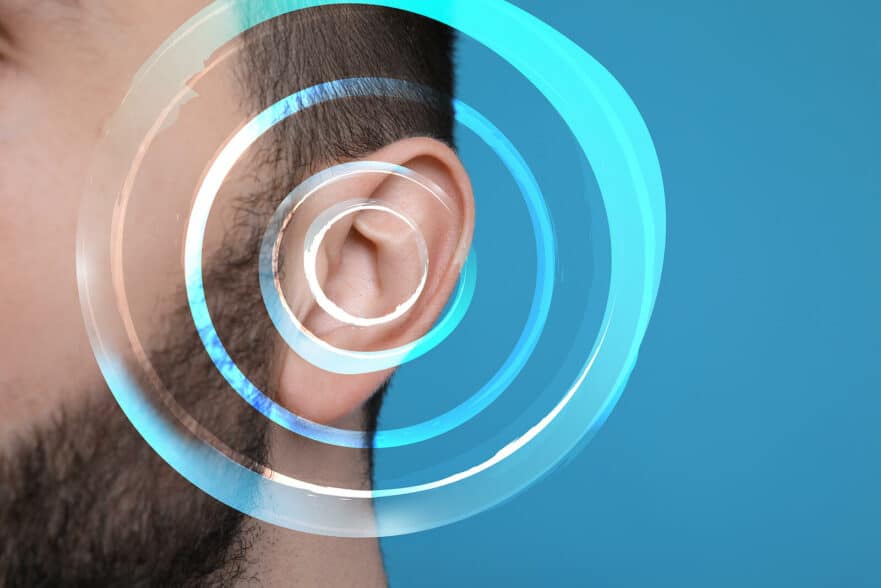- How to Protect Your Ears from Summer Noise Exposure - July 9, 2024
- Dive into Summer Water Sports with Water-Resistant Hearing Aids - June 10, 2024
- Is There a Connection Between Hearing Loss and High Blood Pressure? - May 10, 2024
Do you have a ringing sound in your ears? Maybe it’s more of a buzzing, hissing, or whistling sound. This noise is tinnitus. It can be an unwelcome companion, impacting your quality of life. In this comprehensive guide, we’ll uncover all there is to know about tinnitus – from its causes and types to coping strategies and treatment options. So, let’s unravel the mysteries of tinnitus and find ways to make peace with those phantom sounds.
What is Tinnitus?
Tinnitus is often described as the perception of sound when no external sound source is present. It can manifest as ringing, buzzing, humming, hissing, or even a roaring sound in one or both ears. Tinnitus isn’t a condition itself but rather a symptom of an underlying issue.
Tinnitus can be categorized into two main types:
- Subjective Tinnitus: This is the most common type of tinnitus. Subjective tinnitus is audible only to the person experiencing it and cannot be heard by others. It’s often linked to hearing loss or damage to the auditory system.
- Objective Tinnitus: In rare cases, tinnitus can be objective, meaning that a healthcare provider can hear the sounds during an examination. This type is typically caused by vascular or muscular abnormalities.
Common Causes of Tinnitus
Tinnitus has numerous potential causes, with some of the most common including:
- Exposure to Loud Noise: Prolonged exposure to loud noises, such as concerts, heavy machinery, or firearms, can damage the delicate hair cells in the inner ear and lead to tinnitus.
- Age-Related Hearing Loss: As we age, natural wear and tear on the auditory system can result in hearing loss and tinnitus.
- Earwax Blockage: An accumulation of earwax can interfere with the transmission of sound to the inner ear, causing tinnitus.
- Hearing Loss: Tinnitus is often associated with sensorineural hearing loss, which occurs when the hair cells in the inner ear are damaged or die off.
- Medications: Certain medications, particularly those with ototoxic properties, can trigger tinnitus as a side effect. These medications include some antibiotics, diuretics, and cancer drugs.
- Medical Conditions: Conditions like Meniere’s disease, temporomandibular joint (TMJ) disorders, and high blood pressure can be linked to tinnitus.
- Injuries and Trauma: Head or neck injuries can damage the auditory system and lead to tinnitus.
Living with Tinnitus
Tinnitus can be a challenging companion, but there are strategies to help you manage its impact on your daily life:
- Hearing Aids: If your tinnitus is associated with hearing loss, hearing aids can help by amplifying external sounds and reducing the perception of tinnitus.
- Sound Therapy: Using white noise machines, smartphone apps, or nature sounds can provide relief by masking the tinnitus sounds.
- Counseling: Cognitive-behavioral therapy (CBT) can be effective in changing your reaction to tinnitus and reducing its perceived loudness.
- Tinnitus Retraining Therapy (TRT): TRT combines sound therapy and counseling to help you habituate to tinnitus and reduce its impact on your life.
- Medication: In some cases, medication may be prescribed to alleviate tinnitus symptoms. However, their effectiveness varies from person to person.
Treatment Options
While there’s no cure for tinnitus, various treatment options can help manage its effects. If tinnitus is related to an underlying condition, treating that condition may alleviate or reduce tinnitus symptoms. In certain cases, medication may be prescribed to alleviate tinnitus symptoms. This could include antidepressants, antianxiety drugs, or even a muscle relaxant, depending on the underlying cause.
One of the most common treatments for tinnitus is sound therapy. Modern hearing aids include tinnitus management programs that play white noise or other sounds to mask tinnitus and bring you relief.
Preventing Tinnitus
While not all cases of tinnitus can be prevented, there are steps you can take to reduce your risk:
- Protect Your Ears: Wear hearing protection in noisy environments and keep the volume down on personal audio devices.
- Manage Stress: High stress levels can exacerbate tinnitus symptoms. Engage in stress-reduction techniques like meditation, yoga, or deep breathing exercises.
- Limit Earwax Buildup: Prevent earwax blockages by avoiding the use of cotton swabs and seeking professional ear cleaning when necessary.
- Regular Checkups: Schedule routine hearing checkups with an audiologist to monitor your auditory health.
Finding Harmony with Tinnitus
Tinnitus may be a persistent presence, but it doesn’t have to rule your life. Book a hearing test to find out more about your hearing health and your tinnitus. Together we’ll find the right treatment option to bring you relief.

